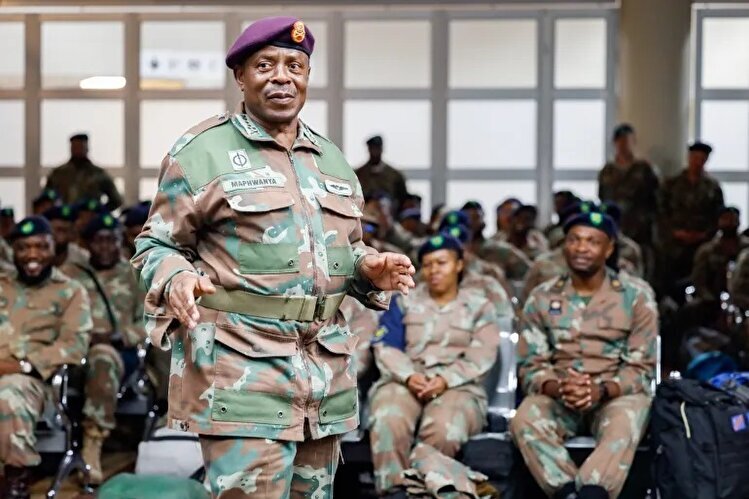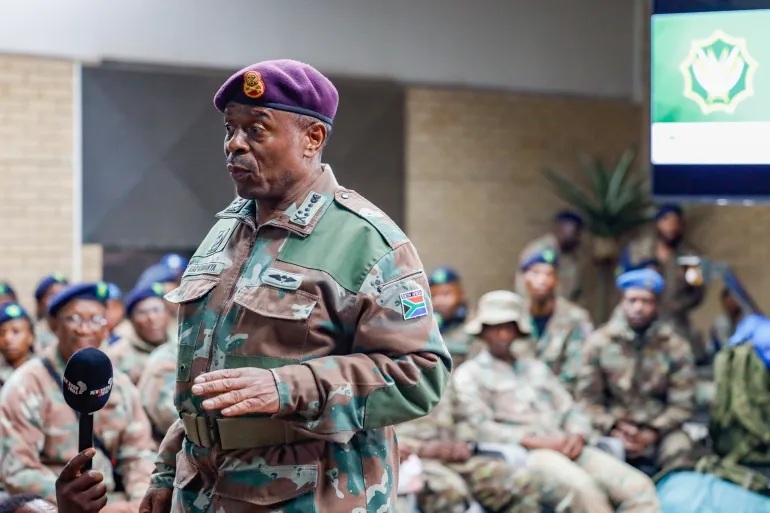When America Stands in the Way of Iran-Africa Friendship
TEHRAN (Defapress) - General Rudzani Maphwanya, the commander of the South African National Defence Force, sparked widespread domestic and international controversy during his recent visit to Tehran when he made statements in support of "solidarity" with the Islamic Republic of Iran. These remarks, which appeared to have been made without coordination with the South African government, drew sharp reactions from the country’s defense and foreign ministries, as well as criticism from the office of President Cyril Ramaphosa.

The incident began when General Maphwanya, during a meeting with Major General Seyed Abdolrahim Mousavi, Chief of Staff of the Iranian Armed Forces, spoke about solidarity with Iran. The South African commander recalled Iran’s historical support for South Africa’s anti-apartheid struggle, stating that these relations had forged an enduring bond between the two nations.
According to reports, his comments included anti-Western positions and criticism of Western interventionist policies, particularly those of the United States. However, these statements quickly spread across media and social networks, including platform X, and were perceived as "unauthorized" and inconsistent with the official policy of the South African government.
Domestic backlash in South Africa was swift and severe. The country’s defense and foreign ministries swiftly distanced themselves from General Maphwanya’s remarks. The Defense Ministry described his statements as "irresponsible" and "reckless," calling for disciplinary action against him. The ministry stressed that his words did not represent the official stance of the government and could harm South Africa’s diplomatic relations.
The office of President Cyril Ramaphosa also issued a statement, describing Maphwanya’s remarks as "misguided and unhelpful." The statement particularly highlighted the negative impact of these comments on South Africa’s efforts to recalibrate its relations with America. The presidency emphasized that such positions could damage South Africa’s standing on the international stage.

Meanwhile, analysts suggest that General Rudzani Maphwanya’s statements could further complicate and worsen the already strained relations between South Africa and the United States.
Notably, General Maphwanya’s remarks implied that Iran and South Africa share common military objectives. However, these comments came at a time when Pretoria has been striving to improve its tense relations with Donald Trump’s administration to stabilize trade ties.
But that’s not the whole story. The role of the United States in creating distance between Iran and South Africa cannot be ignored. As a global power, America has indirectly impacted Iran-South Africa relations through its sanctions and diplomatic pressure against Iran. South Africa, due to its extensive trade and diplomatic ties with the West, has faced pressure to avoid excessive closeness with Iran.
Moreover, U.S. sanctions against Iran, particularly in the economic and oil sectors, have made African nations, including South Africa, more cautious in developing relations with Tehran. These pressures have intensified in recent years, as South Africa has sought to strengthen ties with the United States. Consequently, General Maphwanya’s statements, conflicting with these policies, have been viewed as contrary to South Africa’s national interests.
Additionally, the U.S. has encouraged South Africa to maintain diplomatic distance from Iran through international institutions and bilateral agreements. This was reflected in the South African presidency’s statement, which described Maphwanya’s remarks as an obstacle to recalibrating relations with America.
Ultimately, the criticism against General Rudzani Maphwanya highlights the sensitivities in South Africa’s international relations, a country striving to balance its ties between East and West. The role of America as a driving force in the estrangement between Iran and South Africa, through economic and diplomatic pressure, is clearly evident in this crisis.
